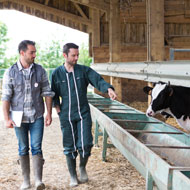Reducing antibiotics in animals ‘has little impact on humans’

RUMA said that while it welcomes the research, the model can only give an indication of likely outcomes.
A new study suggests that reducing the volume of antibiotics consumed by animals alone ‘has little impact on the level of resistance in humans’.
Writing in the journal Royal Society Open Science, researchers add that reducing the rate of transmission of resistance from animals to humans ‘may be more effective than an equivalent reduction in the consumption of antibiotics in food animals’.
The use of antibiotics in farm animals is increasing worldwide and it is thought that numbers will soon exceed the volume consumed by humans. While it is often suggested that reducing volume could have benefits to public health, there is a lack of evidence to support or contradict this advice.
To address this gap in knowledge, researchers at the University of Edinburgh developed a mathematical model to explore the relationship between antibiotic consumption by food-producing animals and levels of resistant bacteria infections in humans.
They conclude that decreasing antibiotic consumption in food animals will often have very limited benefits for human health.
Responding to the study, RUMA, the agriculture and food industry alliance, said that while it welcomes the research, the model can only give an indication of likely outcomes.
RUMA chair Gwyn Jones commented: “The study highlights the complexity of antibiotic resistance and the need for a ‘One Health’ approach to the problem across humans and animals. So while it suggests that removal of antibiotics from animal production systems is not the answer to antimicrobial resistance in humans, the food and farming sector should not in any way dilute its current focus on reducing, refining and replacing antibiotic use across all sectors.
“An important point it does raise, however, is that a drive for ‘antibiotic-free’ farm produce is not necessarily beneficial for human health and makes any related detrimental impacts on animal health and welfare even more unjustifiable. RUMA therefore retains its position that responsible use of antibiotics alongside well-managed, scientifically-robust reductions is the most appropriate approach.”



 The veterinary mental health charity Vetlife is inviting the veterinary community to join it for a sponsored cold-water dip.
The veterinary mental health charity Vetlife is inviting the veterinary community to join it for a sponsored cold-water dip.